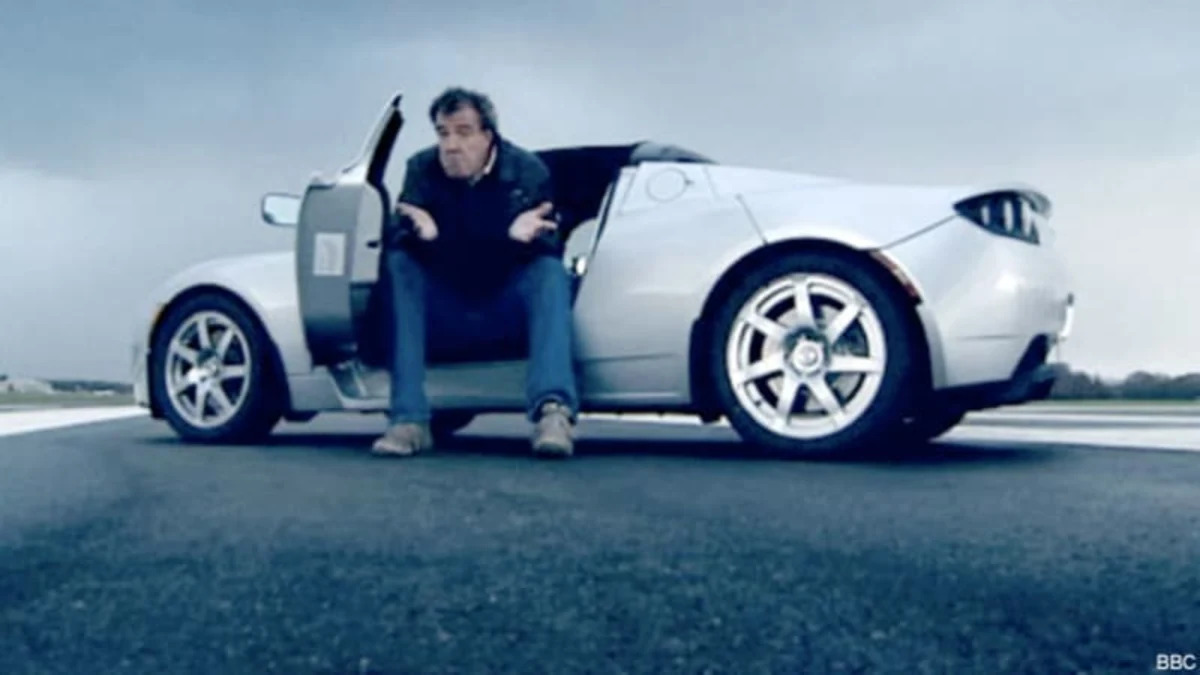Things are heating up considerably around the lawsuit filed last week by Tesla Motors against the BBC. For those unfamiliar with the situation, the suit claims "libel and malicious falsehood" on behalf of the beloved BBC series Top Gear. Tesla is taking issue with the way its all-electric Roadster was portrayed in a 2008 broadcast, in which sharp-tongued host Jeremy Clarkson took to the Top Gear test track in the EV sports car. Things started out well enough for JC and the "biblically quick" Roadster, but took a turn for the worse when the test car ran out of charge, a loaner Roadster overheated, and the first car had to be decommissioned due to issues with the brakes. See for yourself:
So that settles it...if you believe everything you see on TV (or downloaded from BitTorrent in the late 2000's, shame on you). Tesla's suit claims that all of the issues Jeremy encountered with their Roadster were falsified in order "to bolster a pre-judged, pre-determined and pre-scripted adverse verdict." In short, Tesla alleges that Top Gear faked the whole thing.
Under normal circumstances, the public might not be privy to the BBC's defense until after the formal court proceedings. Top Gear executive producer Andy Wilman, however, took to the show's blog to break the silence:
"...[S]ince the other side are being quite noisy with their views on how we conduct ourselves, I just would like to point out one or two things to Top Gear viewers..."
Wilman goes on to deny the claims of defamation by explaining that the episode in question never explicitly stated that either test car had been immobilized, due either to lack of charge or overheating. While upon further examination this may be true, it appears that Tesla's issue is with Top Gear's intent to show that "in the real world, [the Roadster] absolutely doesn't work."
The video meant to be presented here is no longer available. Sorry for the inconvenience.
So that settles it...if you believe everything you see on TV (or downloaded from BitTorrent in the late 2000's, shame on you). Tesla's suit claims that all of the issues Jeremy encountered with their Roadster were falsified in order "to bolster a pre-judged, pre-determined and pre-scripted adverse verdict." In short, Tesla alleges that Top Gear faked the whole thing.
Under normal circumstances, the public might not be privy to the BBC's defense until after the formal court proceedings. Top Gear executive producer Andy Wilman, however, took to the show's blog to break the silence:
"...[S]ince the other side are being quite noisy with their views on how we conduct ourselves, I just would like to point out one or two things to Top Gear viewers..."
Wilman goes on to deny the claims of defamation by explaining that the episode in question never explicitly stated that either test car had been immobilized, due either to lack of charge or overheating. While upon further examination this may be true, it appears that Tesla's issue is with Top Gear's intent to show that "in the real world, [the Roadster] absolutely doesn't work."


Sign in to post
Please sign in to leave a comment.
Continue